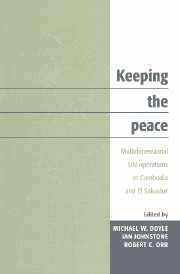Book contents
- Frontmatter
- Contents
- Preface
- Notes on the contributors
- List of abbreviations
- 1 Introduction
- Cambodia
- El Salvador
- Map
- 9 Insurrection and civil war in El Salvador
- 10 Peacemaking in El Salvador
- 11 The El Salvador Peace Accords: using international and domestic law norms to build peace
- 12 From peacekeeping to peacebuilding: restructuring military and police institutions in El Salvador
- 13 Rights and reconciliation in El Salvador
- 14 The arms-for-land deal in El Salvador
- Conclusion and chronologies
- Select bibliography
- Index
9 - Insurrection and civil war in El Salvador
Published online by Cambridge University Press: 22 October 2009
- Frontmatter
- Contents
- Preface
- Notes on the contributors
- List of abbreviations
- 1 Introduction
- Cambodia
- El Salvador
- Map
- 9 Insurrection and civil war in El Salvador
- 10 Peacemaking in El Salvador
- 11 The El Salvador Peace Accords: using international and domestic law norms to build peace
- 12 From peacekeeping to peacebuilding: restructuring military and police institutions in El Salvador
- 13 Rights and reconciliation in El Salvador
- 14 The arms-for-land deal in El Salvador
- Conclusion and chronologies
- Select bibliography
- Index
Summary
Introduction
During the 1970s El Salvador experienced the final phase of a historical cycle characterized by the accumulation of many problems to which the sole answer for many was violence. The events of this decade help explain the advent of popular insurrection, which did not take on the abrupt form of a social explosion but rather that of a gradual and foreseeable outcome driven by socio-economic and political-ideological polarization, constantly exacerbated by governmental repression and the shortsightedness of those in power. The history of the origins of El Salvador's civil war consists of three periods: a long period of intractable social and economic development problems rooted in the agricultural structure, labor relations, and authoritarian government from 1932 to the dictatorship of General Martinez ending in 1944; a pre-revolutionary period of popular pressure, failed reform, and subverted democracy from the fall of the Martinez dictatorship in 1944, to the dramatic election fraud of 1972; and, finally, the transformation of the political crisis into a revolutionary crisis, and the outbreak of civil war in the 1980s. This last period, from the general offensive of 1980 to the signing of the peace agreements in 1991, will be the principal focus of this chapter, though each period will be analyzed in turn.
The origins of the crisis which led to the war
The origins of the political crisis grew out of an incomplete and exogenous modernization process in a society which systematically generated exclusion at all levels.
- Type
- Chapter
- Information
- Keeping the PeaceMultidimensional UN Operations in Cambodia and El Salvador, pp. 207 - 226Publisher: Cambridge University PressPrint publication year: 1997



